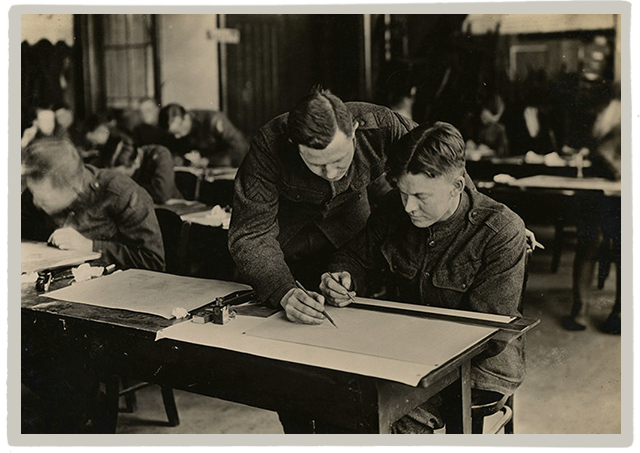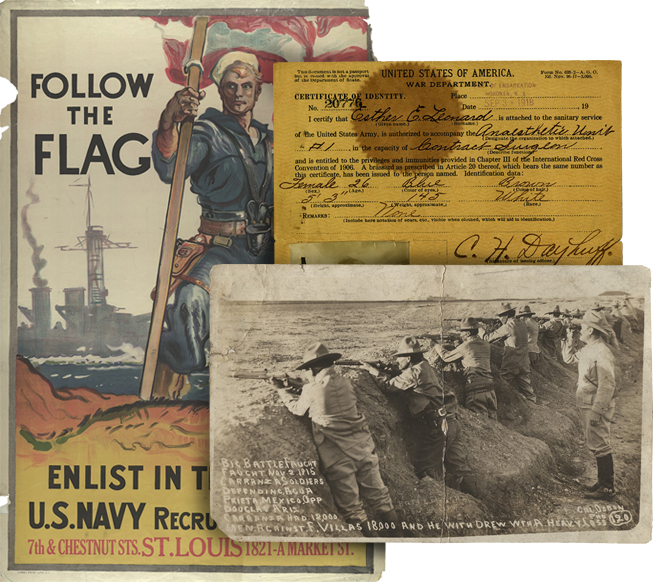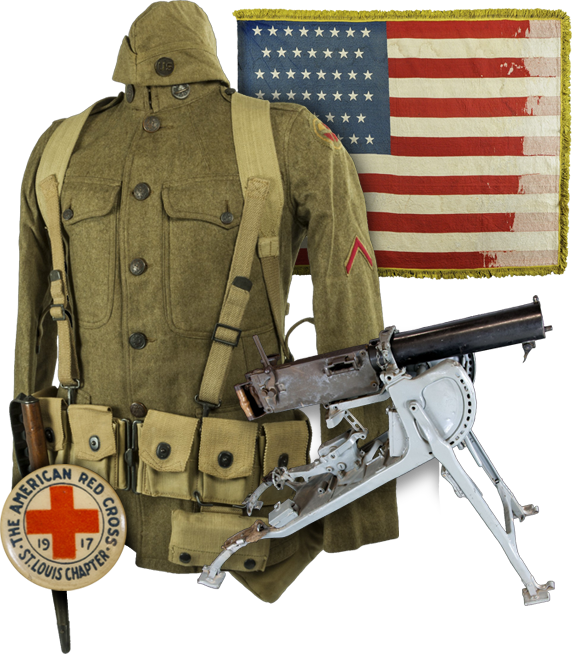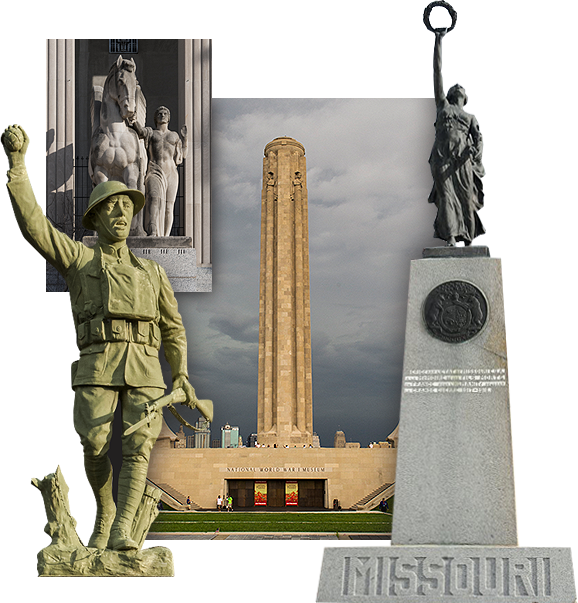John H. Thacher letters to Pards - August 27, 1918 - September 14, 1918

Transcript
Somewhere in Somewhere, August 27. Well, we are really at the place we started for and doing the work we started to do. Behold us, then, in a little chalet high up a mountain-side, our windows looking out into the tops of pine trees, far below us in the valley a little toy village in the greenest of fields. The pine covered mountains roll up to the skies on both sides. We are with a charming French artillery man who will be our host for a few days and then will turn over his Swiss chalet to Miles and me to take command. Our boys have had their little “bapteau de feu” and nobody has been hurt and they are all in high spirits over it. We have the action that comes from the hourly whistle of little artillery pleasantries from the Boches far up the valley. People live in the village below us and women and children come and go and attend to their daily affairs and then when the whistling begins they rush to the dug-outs and cellars just like the dough boys and artillerymen. It all seems like a great night – before the fourth of July affair – this pop – pop of machine gunds down over the mountain back of us and the boom of the pieces over the hills behind the “beyond”. One can not think of it as real war save for occasional little processions to the French-American cemetery in the valley below us. These processions are interrupted now and then by whistling messengers. But the Boches are pretty methodical in their habits and no one back in the artillery sector ever gets hurt very much and very little gas is tossed over to us, so there is nothing to worry about. I can not tell you where we are but it is what the French would call a “Secteur tranquil”. It was very thrilling when a few days ago I crawled around a camouflaged path along the mountain and entered a dark little hole in the ground and looked out through a narrow slit and saw the trenches and the German lines for the first time, gray streaks of barbed wire and little sack-like burrows like mole hill tracings over the knob-like hills and no sign of life anywhere. We are tremendously busy, of course, organizing our batteries in their emplacements, scattered over miles of country, our supplies reaching us by cable, or pack mule and our men becoming goats from mountain climbing. I must run quickly to get this into the outgoing courier’s hands. The Front. [September] 1. Have had such a lot of bully adventures that I would like to talk over with you if the censor permitted. It is quite an adventure in itself to have a courier come in over the long mountain trail to bring letters. Am writing now by the light of a sputtering candle. It will soon be out and when it does we are all starting on more big adventure somewhere else. We have just had our little corned beef and tomatoes (canned) with a new bunch of French officers. They are all war-scarred veterans of four years and are most affable and charming. I really hate to leave this wonderfully picturesque bit of our wandersing, but we are going to have action with a big “A”, that’s what we came for.
Description
Captain John H. Thacher of the 129th Field Artillery wrote from the front lines to his law partners in Kansas City, Missouri describing the movements of the Army in France. Before the war, Thacher worked as an attorney with the firm Rozelle, Vineyard, Thacher, and Boys. He served on the Mexican Border and was later drafted into the Federal Army as Captain of the 129th Field Artillery. After Harry S. Truman took command of the 129th Field Artillery, Thacher was appointed adjutant of the 1st Battalion of the 129th Field Artillery , and later assumed command of the 110th Ammunition Train of the 35th Division.

Transcript
Somewhere in the Big Doings. [September] 7. Our first little whirl at the front is over, nobody hurt and everybody pleased at having been under shell fire and having behaved themselves like little gentlemen. A few horses killed by shells, a sergeant with leg broken when a piece rolled off a cliff with him, an awfully tired and somewhat gaunt bunch of bronzed chow hunters – we find ourselves in billets now close up to the Grand Music. The day I got here was a lovely one, a typical day of soldiers’ ups and downs. Started with the Regiment to lead our battalion over to the entraining point. Hustled my chickens together, had the usual fight with the Q.M. to get them “corned Willie” and rations, to get forage for our horses, to get our telescope, aiming circle and plotting boards, etc., all on the buck-board wagon. Then started off, map in hand, in the drizzling rain to make a 12 mile hike. Passed great streams of French Poilus, cavalry, artillery and trucks, supply wagons, all seething through the narrow road, some going our way, some against us. Made it in three hours, leading our horses most of the way to save them. We were a wet, muddy, bedraggled outfit as we came in. I no sooner lit than I heard that by great good luck Col. Gordon Johnston was on duty there as chief of staff of the 7th Army Corps. We had a long rail ride after I left Gordon and landed late at night in the pitch dark. A Frenchman shoved a 1/50000 heap at me with orders to lead the battalion out into the darkness to a village 25 miles away. No lights allowed either in unloading or en route on account of Boche air bombers. Getting horses, gun caissons, wagons, and supplies off a train in 90 minutes on a crowded quay in the dark is no soft ordnance department job. We got the column started at last, me out in front with my covered flashlight and my map in leather case in the blackest blackness you ever felt through. I went on ahead leaving connecting files behind to keep in touch with Major Miles and the Battalion. At first it was the usual crowded turmoil of a night march in an active sector. Masses of dough boys, trucks, motors, Generals’ cars, ammunition trains marching and seething along the road in both directions. We turned off from them where my map showed the bridge crossed the river, and I followed along the valley until I came to two lonely American sentries who halted me and seemed glad to see home folks so near the front. Then I passed on through one or two villages and by net works of cross roads we had to work out, leaving men as markers to guide the battalion and keep them from straying. We halted occasionally to loosen the cinches and rest the horses. Burke was fine in watching the map. I couldn’t have gotten through without him. When we stopped each time I would drop down in the mud and snooze for a few minutes, then get up, tighten up and go at it again. We had to get the outfit in before daylight, as we are not allowed of course to do the foolish stunt of trapsing artillery around after sun-rise, and if I missed a cross-roads and piled the column up on some blind road, it meant serious delay. Well, somehow, just before daybreak, I pulled into a little village, smelling to heaven, dark and comfortless – but “our billets”. I disposed of my men and horses, found Maj. Miles his bed, got the wagons out of sight, and tumbled off to bed in the back of a wine shop.
Description
Captain John H. Thacher of the 129th Field Artillery wrote from the front lines to his law partners in Kansas City, Missouri describing the movements of the Army in France. Before the war, Thacher worked as an attorney with the firm Rozelle, Vineyard, Thacher, and Boys. He served on the Mexican Border and was later drafted into the Federal Army as Captain of the 129th Field Artillery. After Harry S. Truman took command of the 129th Field Artillery, Thacher was appointed adjutant of the 1st Battalion of the 129th Field Artillery , and later assumed command of the 110th Ammunition Train of the 35th Division.

Transcript
On the Move. [September] 14. We are camped in a great forest near the front. The sound of big guns is almost incessant, and we got here just in time to see one of the most terrific barrages of our experience so far. It has been one long night march after another, mostly in rain and mud, men and animals dead tired, then resting for a day or two and pressing on. The night out from “Stuckville” as we called the town I last wrote you from, was a hard one – rained all the time. We camped in some woods under cover from planes, and when I got in I just dropped in the mud, drew a shelter half over me and slept like little Nicholas in his crib. In the morning we got dried out a little and got some fodder for our tired horses and were ready to pull out again the same evening. That night was a bad one truly. Constant cold rain, long halts when the wind swept man and horse, and made both shake and shiver until our teeth rattled. At every halt we would lurch awkwardly out of our saddles and seek some eves or road side shelter, squat down in the mud and dose until from the head of the column came the command, “Prepare to mount – Mount!” At one place we went through an historic old town, our caissons and horses hoofs rattling and re-echoing on the cobble stones – past chateaux, hotel de ville, palais de justice, gare, and squares with statues, all the time the sky lightened and blazoned with the terrific cannonade. The latter kep up for eight solid hours. I know less than you do about it all except that it was preliminary to a great American push that was entirely successful, gained all its objectives, captured 10,000 prisoners and found the morale of the enemy poor and weakening. To us it was just rain and mud and plodding eternally into the dark through long crowded roads, past artillery stuck in the mud, or infantry columns that dodged under our horses feet, and always a few miles away, like summer lightning glare, like the constant rumble of a great river falling over a precipice, the roar and thunder and flash of the great barrage. It is wonderful to see the spirit of the men – tired, gaunt, hungry – give them but a little wink of sleep and a sniff of coffee and a bit of hard tack and they are singing and whistling and joking. If people could just understand the soul and mind and spirit of the American civilian at war – You can’t beat him – God bless him! At the last engagement at the front my young lieutenant of the radio and telephone detail got out and mended the wires under fire.
Description
Captain John H. Thacher of the 129th Field Artillery wrote from the front lines to his law partners in Kansas City, Missouri describing the movements of the Army in France. Before the war, Thacher worked as an attorney with the firm Rozelle, Vineyard, Thacher, and Boys. He served on the Mexican Border and was later drafted into the Federal Army as Captain of the 129th Field Artillery. After Harry S. Truman took command of the 129th Field Artillery, Thacher was appointed adjutant of the 1st Battalion of the 129th Field Artillery , and later assumed command of the 110th Ammunition Train of the 35th Division.

Transcript
Somewhere near the Big Music. [September] 10, 1918. Dear Pards:- I have just received your letter with plaintive appeal for news as to my whereabouts and as the latter are the one thing I can’t tell you, I must let your childish curiosity go unsated. Anyhow I can hear machine guns and see hostile Boche planes and I am in a place where bombs are dropped like delicate, fragrant confetti from the clouds – especially if you live in or near anything that looks like a hospital. An American Lieutenant in the French Artillery told me he was out in Albania with the Red Cross and connected with a hospital that was the only big building in a green dish of a valley and nothing remotely resembling a military camp or building anywhere near it. It was plastered over with red crosses – but in spite of everything the delicate Hun sped thither at five every morning in his aeroplane and turned his machine gun loose on the hospital and dropped bombs on the sick and wounded. So they used to evacuate the building for the dugouts every morning at 4:30 – and that’s no I-hate-the-English lie either! Gee! But it will be sweet to kill the barbarians – and we’re going to have a whack at them again soon! We had a long hard trip up here after our little baptism of fire up in the mountains. Nearly all night marches and some hard, trying work in reconnaissance at night. You get off a railroad train in the night. A French official shoves a 1/80000 hachured map under your nose, of a country you have never seen before and only distantly heard of. He points to some little cross-roads village on it twenty-five miles away and jabbers a stream of French until his brakes slip and he skids. Then you are expected to get the battalion off the train in the pitch black, get the horses, caissons, pieces, four guns and all hitched up, all without a light, and start off in the Stygian darkness through a network of cross-roads to your billets. On this last hike we started at 11 P.M. and got in at 5 in the morning – all by map and compass and signboards and bum French. A smelly little village with manure heaps in the street half as high as the houses and an open sewer through the principal street – my billet in the back of a wine shop, so I do not fare so badly. Saw Gordon Johnston – now a colonel and chief of staff of the 7th Army Corps. Was just in, wet and hungry and tired from a twelve mile hike. He took me in like a good Princeton man would. Gave me a hot bath, supplied the clean dry underclothes I now wear, had his orderly polish my “puts” and – greater love hath no man than this – divided his last carton of cigarettes with me. Promised to write to Edith and send gifts to the kids for me. Wants to get Roger on the staff as interpreter. You’d better not fool away little Jim on M.U. but send him to a college that binds men together like that! Your mess funds are a life-saver now as lots of gaunt young sodgers-men in this regiment will testify. Regards to Miss Marsh and Miss Albers. Yours John H. Thacher Capt. 129 F.A.
Description
Captain John H. Thacher of the 129th Field Artillery wrote from the front lines to his law partners in Kansas City, Missouri describing the movements of the Army in France. Before the war, Thacher worked as an attorney with the firm Rozelle, Vineyard, Thacher, and Boys. He served on the Mexican Border and was later drafted into the Federal Army as Captain of the 129th Field Artillery. After Harry S. Truman took command of the 129th Field Artillery, Thacher was appointed adjutant of the 1st Battalion of the 129th Field Artillery , and later assumed command of the 110th Ammunition Train of the 35th Division.
Details
| Title | John H. Thacher letters to Pards - August 27, 1918 - September 14, 1918 |
| Creator | Thacher, John H. |
| Source | Thacher, John H. Letters to Pards. 27 August 1918 - 14 September 1918. John H. Thacher Papers. Harry S. Truman Library and Museum, Independence, Missouri. |
| Description | Captain John H. Thacher of the 129th Field Artillery wrote from the front lines to his law partners in Kansas City, Missouri describing the movements of the Army in France. Before the war, Thacher worked as an attorney with the firm Rozelle, Vineyard, Thacher, and Boys. He served on the Mexican Border and was later drafted into the Federal Army as Captain of the 129th Field Artillery. After Harry S. Truman took command of the 129th Field Artillery, Thacher was appointed adjutant of the 1st Battalion of the 129th Field Artillery , and later assumed command of the 110th Ammunition Train of the 35th Division. |
| Contributing Institution | Harry S. Truman Library and Museum |
| Rights | Documents in this file are in the public domain. |
| Date Original | 1918 |
| Language | English |



